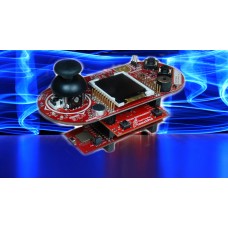edX - Realtime Bluetooth Networks
For the class, you will need 1) a TM4C123 or MSP432 LaunchPad, 2) I/O booster pack, and 3) a CC2650 module.
- LaunchPad: EK-TM4C123GXL or MSP-EXP432P401R [Please choose which board you want]
- MK-II I/O booster: BOOSTXL-EDUMKII
- CC2650 Bluetooth module: LAUNCHXL-CC2650
You will need either a TM4C123 LaunchPad or a MSP432 LaunchPad. All the projects we will develop in this course will run on either of these microcontroller boards.
| TM4C123 | MSP432 |
| Cortex M4F | Cortex M4F |
| 43 I/O pins | 84 I/O pins |
| Runs at 80 MHz | Runs at 48 MHz |
| 256k ROM, 32k RAM | 256k ROM, 64k RAM |
| CAN, USB | no CAN, no USB |
| Two 12-bit ADCs | 14-bit ADC |
| More 32-bit timers | Low power features |
Next you will need is MK-II I/O booster
The embedded systems in this class combine input/output devices with the Cortex M microcontroller running your RTOS. In order to place the focus of this class on the RTOS and away from the hardware/software interface,you will be using the MK-II Educational BoosterPack that contains a rich set of I/O devices.
This course deals with creating a real-time operating system for embedded systems. One of the important resources the OS must manage is I/O. It is good design practices to provide an abstraction for the I/O layer. Three equivalent names for this abstraction are hardware abstraction layer (HAL), device driver, and board support package (BSP). From an operating system perspective, the goal is the make it easier to port the system from one hardware platform to another. The system becomes more portable if we create a BSP for our hardware devices. In this class we provide a BSP for the MKII BoosterPack that encapsulates the following:
- Button input, 2 switches
- Joystick input, two channel analog and one button
- LED output, 3-color
- Buzzer output, PWM controls loudness
- Acceleration input, three channel analog
- Microphone input, one channel analog
- LCD graphics output, 128 by 128, 16-bit color
- Light sensor input, I2C
- Temperature sensor input, I2
Third and last product ypu will need is LAUNCHXL-CC2650 LaunchPad. This is the most flexible solution, because there are multiple ways with which this module can be reprogrammed. In particular, if you wish to create a single microcontroller system with Bluetooth connectivity you could implement the entire application, RTOS, and Bluetooth stack on the CC2650 LaunchPad. Creating this one-chip solution will be beyond the scope of this class, and will require learning TI's Code Composer Studio, TI's RTOS, and the CC2650 I/O devices. However for this class you could use the CC2650 in BoosterPack mode and be able to plug the CC2650 LaunchPad directly onto the TM4C123/MSP432 LaunchPad creating a three board stack with the MSP432/TM4C123 LaunchPad + MK-II I/O boosterpack + CC2650 LaunchPad (in boosterpack mode). The software you write on the TM4C123/MSP432 LaunchPad will be the same regardless of whether you implement Bluetooth with the CC2650 BoosterPack or the CC2650 LaunchPad.
This Kit Includes -
- LaunchPad: EK-TM4C123GXL or MSP-EXP432P401R [Please choose which board you want. ]
- MK-II I/O booster: BOOSTXL-EDUMKII
- CC2650 Bluetooth module: LAUNCHXL-CC2650
Enter the code in the box below:


